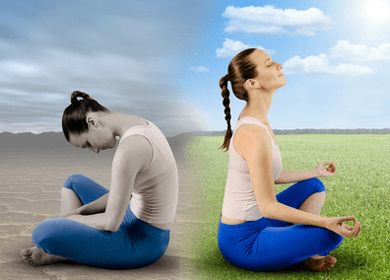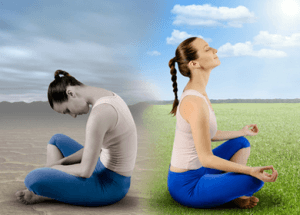
Imagine that you were floating along a river and suddenly stood up; you’d most likely find yourself fighting the natural flow of water and you’d struggle to stay on both feet. In other words, you’d suffer. But what if, instead, you followed the river’s currents? You’d suffer less. Allow me to explain the benefits of flowing with life and how meditation can help you do this.
 A One Paragraph Guide to Meditation and It’s Objective
A One Paragraph Guide to Meditation and It’s Objective
When we sit upright, close our eyes, and relax, perhaps following a prayer or a mantra, we’ll observe thoughts come and go. Sometimes we’re completely engaged with them, while other times we’re able to witness them as outside observers. Regardless of whether we engage or observe, we return to our breath without clinging to any particular thought.
So What’s Wrong with Clinging?
After all a thought may feel really good. The problem is that when we attach to anything—be it an object, person, or thought—we begin to fear losing it. This fear, in and of itself, will cause us to suffer. For example, image you’re spending a time with someone you love. You’re enjoying one another’s company immensely. Suddenly, thoughts arise, such as “I don’t want this to end” and “How can I make this last longer?”
Meditation teaches us to fully engage with the present moment. By doing so we enjoy the object or person that’s in front of us right now. But we realize that this moment will pass because we recognize that life is constantly in flux. Rather than feel sad about the change, however, we enjoy those around us more deeply and richly. As a result, we become what I call “maximum enjoyers” of the present moment. We’re less fearful of what comes our way because inevitably whatever is happening now will change.
But What About When Someone Hurts Us?
When others behave unkindly to us, it can be difficult. The good news, however, is that because meditation teaches us how to not cling to anything, whatever we’re experiencing right now—good or bad—will change. Rather than remain stuck in past painful memories and fearful of going experiencing the same amount of pain again, meditation trains us to see that every state of being changes.
In addition, meditation causes us to become more objective when it comes to how we approach life. We may ask ourselves questions such as, “Were there any signs that this person would hurt me?” Perhaps we realize that we moved too quickly into a particular relationship. By slowing down, we could have decreased the degree to which someone hurt us.
Meditation Is No Suffering Cure
Sad experiences are part of life. But what it does is demonstrate that we’re taking care of ourselves. It increases our love for who we are. And when we truly love ourselves, we’re able to love others more.
We have everything inside us, right now, to be happy. We we’re fully present, we see that all is well. We learn to cling less to our fears and desires. Meditation teaches us to how to fully engage with what comes our way. We learn to trust that things may not always go well, but we’re confident that all will be well no matter what. Through regular practice, meditation encourages us to flow with life, enjoy it, and be present with it—one breath at a time.
– Dr. Robert Puff
Dr. Robert Puff, Ph.D. is a clinical psychologist, author, international speaker, and meditation expert who has been counseling individuals, families, nonprofits, and businesses for over twenty years. A contributing writer to Psychology Today, he has authored numerous books and creates a weekly podcast on happiness at http://www.HappinessPodcast.org He also creates a weekly podcast on meditation, http://www.MeditationForHealthPodcast.com and a weekly podcast on spiritual enlightenment, http://www.EnlightenmentPodcast.com

